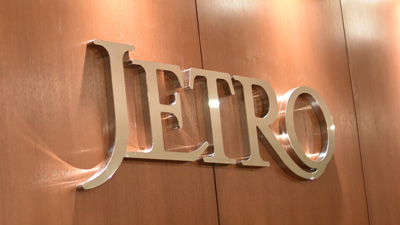Pangolin Robot Japan Co., Ltd.
In April 2017, Suzhou Pangolin Robot Corp., Ltd, manufacturer of service robots, established a Japanese corporation with the goal of expanding its business in the Japanese market and engaging in joint research with universities and other institutions in the country. We asked Ding Jinsong, President of Pangolin Robot Japan, about the back ground of establishing the office in Japan and its future business prospects.

Service robot manufacturer with a dominant market share in China
Founded in 2006 in China (Jiangsu Province), Suzhou Pangolin Robot Corp., Ltd. is a comprehensive manufacturer of large service robots for businesses. The company develops, manufactures and sells mainly guide robots and food server robots, for service industries such as banks, hotels, shopping malls and restaurants. In addition to the head office in Jiangsu, Suzhou, there are branches in Beijing, Shenzhen, Wuhan, Chengdu and other locations. With a production facility stretching 4,000 m2, and research and development center another 2,500 m2, the company is now turning out 50,000 robots annually. Suzhou Pangolin has a sales network throughout China and offers products in about 200 cities, with customers including the Bank of China, HSBC, McDonald’s, and Starbucks Coffee. In February 2017, it was listed on China’s new OTC market (National Equities Exchange and Quotations) and now dominates about 70% of the food server robot market in China. According to Mr. Ding, “In China, competition is intensifying in the field of small toy robots, which have high demand in the B-to-C business, but for our large-sized robots of more than 1.2 meters, there are few competitors because there are so many points to be solved in terms of locomotion.”
Although the company’s current overseas sales are mainly limited to demonstration models, they are exported to 20 countries, including the United States, Japan, Korea, Singapore, Russia, Italy, and Spain. “We are using online platforms such as Alibaba to negotiate with customers overseas,” Mr. Ding explains. “Although it is rare for us to go on sales trips abroad, we expect the number of shipments to rise, as long as the products are without problems,” he said with regard to his expectations for future overseas business expansion.
Aiming for market expansion with “Japanese quality”
Pangolin Robot Japan Co., Ltd. (hereinafter referred to as Pangolin Japan), is a joint venture between the parent company Suzhou Pangolin Robot Corp., Ltd., Campus Create Co., Ltd., a technology licensing organization (TLO) of the University of Electro-Communications (UEC), and hapi-robo st Inc., a robotics-related subsidiary of Huis Ten Bosch Inc. Mr. Ding, who had studied in Japan and worked for a Japanese manufacturer, was appointed to CEO of the Japanese subsidiary by Song Yugang, the CEO of Suzhou Pangolin Robot Corp. Ltd., who himself has experience working for a Japanese electronics manufacturer in China and found a kindred spirit in Mr. Ding.
The office has been established in the UEC Alliance Center, a joint research facility of UEC where Mr. Ding previously attended graduate school and with which Suzhou Pangolin Robot began cooperating in 2014. Mr. Ding remarks, “An old friend from my graduate school days in Japan works at Campus Create so I was able to make good use of personal connections. The idea of establishing a Japanese corporation was to expand markets there and pursue collaborative research with universities and companies in Japan, so as to grasp the latest technologies. Robotics research in Japan leads the world and because there are many component manufacturers there, they are excellent partners for collaborative research and development.”
With regards to the company’s Japanese business and market expansion, Mr. Ding affirms, “Demand for quality from Japanese customers is the most strict in the world. For example, people in many other countries will show interest even in the early stages but the Japanese remain uninterested unless a product is perfect.” He adds, “If we can meet this level of demand, our credibility will increase and we can expand our business to the rest of the world.”
The company is planning mass production at the main factory in China starting from 2018. To strengthen its quality control system, it has appointed two Japanese experts with long manufacturing experience as plant and quality control managers. Mr. Ding explains, “Although the quality of Chinese products has improved, there is still a difference compared to Japanese products. In the future, we want to raise our quality to the same level.”
Pangolin Japan delivered a humanoid cooking and serving robot, “Amy”, the first line in Japan for the company, to the “Henn-na Restaurant ROBOT” (Strange Restaurant Robot) located inside Huis Ten Bosch Theme Park in Nagasaki Prefecture. To help the restaurant workers understand the correct operational methods, the company repeatedly dispatched engineers to the site after the initial delivery. “When customers encounter problems with our robots, we head straight to their location and provide after-sales service. Otherwise, they will be in trouble. We provide full support rather than just delivery.” Mr. Ding stresses the importance of after-sales service, adding that the company is also highly praised for such service in China.
Innovation through industry-university cooperation
The movements of the company’s current server robot in Japan, are guided over magnetic tape affixed on the floor. Costs of the food-serving robot Amy are thus reduced by limiting the functions necessary for the robot. While “there is a strong tendency not to buy a product unless it is perfect in Japan,” these robots can free staff to perform other duties, thus relieving personnel shortages.
Meanwhile, the company is also active in technological innovation. In collaboration with the UEC, which excels in robotics development, they developed a next-generation Amy that moves autonomously by incorporating simultaneous localization and mapping (SLAM), a system that uses laser sensors to identify its location. In its collaboration with the UEC, in addition to developing technology, Mr. Ding reveals, "It is also helpful for us to learn about trends in the world's robot market from professors" He admits that it is difficult for the company to grasp information on the cutting edge of technology on its own. For the UEC, it is also a good opportunity to conduct experiments at actual restaurants using the company’s products. Being able to apply research results in the real world creates a win-win relationship for this kind of industry-university partnership.

“Amy” working at the restaurant in Huis Ten Bosch
High interest in communication and nursing robots
At some stage in the future, Mr. Ding says he wants to make a communication robot that answers any question asked of it. To that end, the company is experimenting with AI-based machine learning by introducing robots to hospitals, schools, restaurants and other facilities, and collecting and analyzing big data. Mr. Ding says, “Although there are risks, we will be able to offer better services to customers by putting products on the market at an early stage to collect evaluations, information and various data.”
There is also a high level of interest in nursing robots. China’s population over the age of 60 reached 240 million as of the end of 2017, accounting for approximately 17% of the country’s total. The company anticipates a rising demand in nursing care, with commensurate business opportunities, as the society continues to age. It is currently test marketing the nursing care robots of a Japanese maker in China. “The quality of Japanese robots is excellent but they cost twice as much as those made in China,” says Mr. Ding. From here on, Pangolin Japan plans to establish a separate company specializing in nursing care robots and jointly develop cheaper products for the Chinese market with the Japanese company. “I want to generate returns through Pangolin’s business, engage in big projects and go public in Japan as well. If the company can get listed, I want to develop, design and ultimately manufacture service robots in Japan,” says Mr. Ding with bigger dreams in mind.

(From left) Mr. Song, CEO of Suzhou Pangolin Robot; Ms. Lee, Secretary of the President; Mr. Ding, President of Pangolin Japan; and their robots Alice, Snow and Amy
JETRO’s support
As Pangolin established its Japanese base, JETRO provided information on companies involved in robotics and related industries as well as market, regulatory and institutional information. Mr. Ding is openly appreciative. “Being introduced to Japanese companies in the robotics field was invaluable,” he says. “JETRO’s network is not limited to regions in Japan; it spans the entire globe. They are an organization that can connect you to both Japanese and overseas companies. I also hope for their contribution in improving the image of Asian companies in Japan. Changing a stereotype isn’t easy, and although there are still areas to improve upon in Chinese companies when compared to Japanese, firms that provide good products and services certainly exist.”
Lastly, Mr. Ding concluded, “I studied in Japan, learned Japanese technology and feel very good about the current situation where I am able to utilize my abilities between Japan and China. Because we have bases of operations in Japan and China I feel that our company is acting as a bridge between the two countries.”(Interviewed March 2018)
(Interviewed March 2018)
Company history
- July 2006
-
Establishment of Suzhou Pangolin Robot Corp., Ltd. in Suzhou, China
- April 2017
-
Establishment of Pangolin robot Japan Co., Ltd. in Chofu, Tokyo
Pangolin Robot Japan Co., Ltd.
- Establishment
-
April 2017
- Business overview
-
Development and sales of service robots
- Capital
-
10,000,000yen
- Parent Company
-
Suzhou Pangolin Robot Corp., Ltd. (China)
- Address
-
Room 522 UEC Alliance Center, 1-1-1 Kojimacho, Chofu-shi, Tokyo, 182-0026
- URL
Support from JETRO
- Provision of information on the Japanese market and companies
- Provision of information on regulations and relevant legal systems
Related Industry
Regional Information
Explore More
-

Success Stories
Success Stories are based on interviews conducted with foreign companies and foreign-affiliated companies that have successfully come into the Japanese market.
-

JETRO’s Support
We provide consistent one-stop service for establishing a base or expanding business in Japan.
-

Setting up Business
You can find information on overall and detailed steps, cost estimation, an overview of the laws, regulations and procedures related to setting up business, and more.
Contact Us
Investing in and collaborating with Japan
We will do our very best to support your business expansion into and within Japan as well as business collaboration with Japanese companies. Please feel free to contact us via the form below for any inquiries.
Inquiry FormJETRO Worldwide
Our network covers over 50 countries worldwide. You can contact us at one of our local offices near you for consultation.
Worldwide Offices




























